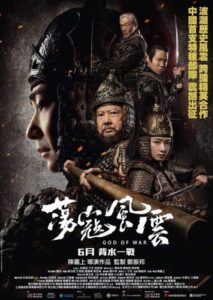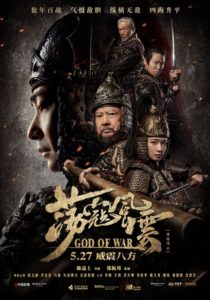God of War
荡寇风云
China/Hong Kong, 2017, colour, 2.35:1, 129 mins.
Director: Chen Jiashang 陈嘉上 [Gordon Chan].
Rating: 8/10.
Powerful costume drama is a belated bounce back by Hong Kong director Chen Jiashang [Gordon Chan].
Zhejiang province, eastern China, 36th year of Ming emperor Jiajing, AD 1557. For the past 20 years, pirate raids by Japanese and others along the eastern coast have become worse and have now reached a peak. After five months Zhejiang garrison commander Yu Dayou (Hong Jinbao) has made no progress against them and also recently been wounded. Zhejiang supreme military commander Hu Zongxian (Wang Ban) brings in another general, Qi Jiguang (Zhao Wenzhuo), who had had some success against the pirates several months earlier, to see what he can do. Taking over a siege of the captured Cen Harbour from Yu Dayou, Qi Jiguang catches the Japanese unawares at dawn, enabling him and Yu Dayou to recover Cen Harbour, though the pirates, led by veteran samurai Kumazawa (Kurata Yasuaki) and younger lord Yamagawa (Koide Keisuke), escape. For this, Hu Zongxian is forced by the imperial secret police to “punish” Yu Dayou  by putting him under arrest for a while. Back home in Xinhe city, Qi Jiguang spends time with his wife (Wan Qian) and also visits Yu Dayou, with whom he playfully spars. Recognising a weakness in the Chinese forces, Qi Jiguang has the revolutionary idea of forming a special force, made up of ordinary miners and farmers from Yiwu, led by Chen Dacheng (Hong Tianming), who has impressed him with the way they defended their property. Hu Zongxian finally agrees to the idea and agrees to fund it, and Qi Jiguang starts whipping the unruly bunch into military shape. In 1561 the pirates re-group and Qi Jiguang’s army of 3,000 sets out to do battle with 20,000 pirates, the biggest single force so far. When the pirates divide their force against both Xinhe and Taizhou cities, Qi Jiguang puts family considerations aside and decides to first take on the pirate’s elite in Taizhou. In the meantime, his wife leads the defence of Xinhe; but the battle in Taizhou takes Qi Jiguang longer than expected.
by putting him under arrest for a while. Back home in Xinhe city, Qi Jiguang spends time with his wife (Wan Qian) and also visits Yu Dayou, with whom he playfully spars. Recognising a weakness in the Chinese forces, Qi Jiguang has the revolutionary idea of forming a special force, made up of ordinary miners and farmers from Yiwu, led by Chen Dacheng (Hong Tianming), who has impressed him with the way they defended their property. Hu Zongxian finally agrees to the idea and agrees to fund it, and Qi Jiguang starts whipping the unruly bunch into military shape. In 1561 the pirates re-group and Qi Jiguang’s army of 3,000 sets out to do battle with 20,000 pirates, the biggest single force so far. When the pirates divide their force against both Xinhe and Taizhou cities, Qi Jiguang puts family considerations aside and decides to first take on the pirate’s elite in Taizhou. In the meantime, his wife leads the defence of Xinhe; but the battle in Taizhou takes Qi Jiguang longer than expected.
REVIEW
After more than a decade in the creative long grass, Hong Kong director Chen Jiashang 陈嘉上 [Gordon Chan] bounces back with God of War 荡寇风云, one of the strongest films of his career and in a genre – the costume action movie – in which he’s never seemed at home. Grittily realistic and well dialogued, rather than fantastic and VFX-driven – which perhaps explains its disappointing Mainland box office of only RMB65 million – God shows that Chen, now 57, still has some juice left after almost 30 years in the business.
The film manages the trick of combining character development side-by-side with the action, of maintaining interest during quieter individual moments rather than just making them padding between the battles. Strong dialogue, which actually throws up more points of interest than the film ever fully explores, and a cast that punches over the characters rather than just looks good in costume, account for much of the film’s success. But God also has a vitality and sense of purpose that’s long been missing from Chen’s output, especially other costume movies like the lame Mural 画壁 (2011) and routine The Four 四大名捕 trilogy (2012-14).
After a successful decade in all kinds of genres – from The Yuppie Fantasia 小男人周记 (1989) through nonsense-comedy Fight Back to School 逃学威龙 (1991) to action dramas like The Final Option 飞虎雄心 (1994) and Beast Cops 野兽刑警 (1998) – Chen had difficulty adapting to the production Zeitgeist of the new century, with only the crime drama A-1 A-1头条 (2004) showing a fresh direction and the videogame adaptation The King of Fighters 拳皇 (2010), shot in Vancouver, marking a new low. Painted Skin 画皮 (2008), Mural and The Four trilogy showed him trying to get to grips – not very successfully – with the new era of Mainland costume action movies, a switch that finally finds fruition in God of War.
The setting is the era of raids by Japanese pirates – popularly dubbed wōkòu 倭寇 (“dwarf pirates”) – on China’s east coast in the 16th century during the Ming dynasty, a subject already dealt with in films from The Valiant Ones 忠烈图 (1975) by Hu Jinquan 胡金铨 [King Hu] to the arty The Sword Identity 倭寇的踪迹 (2011) by Xu Haofeng 徐浩峰. The long, complex era is impossible to summarise in a single movie, and God also makes no attempt at a revisionist approach by incorporating recent thinking that the pirates weren’t just Japanese but also Chinese, Koreans, Portuguese and others. It’s basically a Chinese vs Japanese costume movie, with the ingenuity and adaptability of the former finally winning out against the code-bound arrogance of the latter – a familiar nationalist recipe. The fresh element comes from within, by focusing on famous Ming general Qi Jiguang (1528-88), a brilliant strategist credited with being the first to set up his own, specially trained army drawn from farmers and miners after noticing flaws in the regular Ming army.
Many of the characters in God also appeared in the heavily fictional 34-part Mainland TV drama The Shaolin Warriors 少林僧兵 (2008), with Malaysian actor Li Mingshun 李铭顺 [Christopher Lee] as Qi Jiguang. In God, whch sticks closer to the facts of Qi Jiguang’s career, he’s played by Mainland actor/martial artist Zhao Wenzhuo 赵文卓 who’s now, in his mid-40s, finally developing some gravitas (his traitorous general in The White Haired Witch of Lunar Kingdom 白发魔女传之明月天国,2014) and strikes up some warm chemistry in the first half with veteran Hong Jinbao 洪金宝 [Sammo Hung] as a by-the-book general he temporarily replaces. Though it has nothing to do with the main plot, the pair’s playful combat sequence is one of the film’s major delights – amazingly the first time the two have been together on screen.
The fact that when Hong disappears his giant presence isn’t missed is a tribute to the depth of casting. Hong’s eldest son, half-Korean Hong Tianming 洪天明, now 43, makes a major impression as the no-nonsense leader of some local miners who form the core of Qi Jiguang’s new army, while Mainland TV-theatre actor Wang Ban 王斑, 46, is strong as the local supreme commander, caught between ruthless Ming politics and his admiration for the unconventional Qi Jiguang. Amid all the male-ness, classy Mainland actress Wan Qian 万茜, 35, who was so good as the lead’s love interest in Paradise in Service 军中乐园 (2014) and as the central character in The Insanity 你好,疯子! (2016), holds her own in the fictional role of Qi’s wife, a manipulative but gutsy woman who even manages to make her filmy transformation into a warrior-wife half-believable. On the Japanese side, top casting of veteran actor/martial artist Kurata Yasuaki 仓田保昭, 71, as the samurai code-driven leader, pays off in the memorable final duel, capped by an equally memorable last line from Kurata’s purring old warrior.
Chen’s drafting of other Japanese talent also helps to give the film a fresh feel, especially in the costumes by Wada Emi 和田惠美 for the pirates and the cinematography by Ishizaka Takuro 石坂拓郎, who shot the Rurouni Kenshin るろうに剣心 trilogy (2012-14) that Chan & Co. appear to have studied for the action bits. Orchestral scoring by Japan’s Umebayashi Shigeru 梅林茂 (The Grandmaster 一代宗师, 2013) is attentive to mood throughout, not just the usual action wallpaper, while editing by Hong Kong’s Chen Qihe 陈祺合 [Chan Ki-hop] is terrific, mobile but smooth. Art direction by Hong Kong’s Qiu Weiming 邱伟明 [Alfred Yau] reinforces the realistic mood.
CREDITS
Presented by Bona Film Group (CN), East Wave Film Group (CN), Media Asia Film Production (HK).
Script: Chen Jiashang [Gordon Chan], Xiong Zhaozheng, Huang Simin, Tan Guangyuan, Wu Mengzhang. Photography: Ishizaka Takuro. Editing: Chen Qihe [Chan Ki-hop]. Music: Umebayashi Shigeru. Art direction: Qiu Weiming [Alfred Yau]. Styling: Wada Emi. Sound: Du Duzhi. Action: Qin Pengfei. Special effects: Huang Hongxian.
Cast: Zhao Wenzhuo (Qi Jiguang, general), Hong Jinbao [Sammo Hung] (Yu Dayou, general, Zhejiang garrison commander), Wan Qian (Qi Jiguang’s wife), Koide Keisuke (Yamagawa, young Japanese lord), Kurata Yasuaki (Kumazawa, elder Japanese lord), Wu Yue (Yang Chao, Qi Jiguang’s deputy), Wang Ban (Hu Zongxian, Zhejiang supreme military commander), Hong Tianming (Chen Dacheng, Yiwu miners’ leader), Liu Junxiao (Qi Jimei, Qi Jiguang’s younger brother), Tang Wenlong (Lou Nan, Qi Jiguang’s subordinate), Kohata Ryu (Kohata, Japanese pirate), Wang Jing (Wu Weizhong), Wang Mulin (Da Ya, Yang Chao’s colleague), Shu Yaoxuan (Lu Tang, Zhejiang deputy military commander).
Release: China, 27 May 2017; Hong Kong, 15 Jun 2017.
